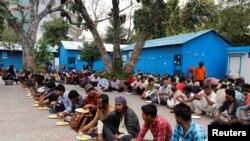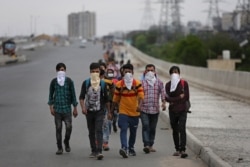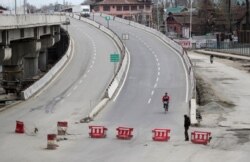India has announced a $22.6 billion economic package to ensure that no one goes hungry during the nationwide coronavirus lockdown that has left tens of millions of poor people struggling without livelihoods.
Finance Minister Nirmala Sitharaman said the government would provide food rations and cash transfers for three months to take care of “the welfare concerns of poor and suffering workers, and those who need immediate help.”
India’s three-week lockdown to slow the spread of coronavirus that started Wednesday put 1.3 billion people inside their homes and suspended virtually all economic activity.
India has recorded 649 coronavirus infections and 13 deaths – numbers that health experts warn are projected to spike in the same manner that some European countries and the United States have experienced.
Worries are high about the devastating impact the shutdown will have on millions of poor people who work in the country’s vast informal sector with no access to benefits and few savings to fall back on.
Millions of migrant workers have streamed back from cities to their villages in recent days as commercial establishments and factories have shut down.
But many have been stranded in cities as train and bus services have ground to a complete halt.
For many of them, like Sajjad Ali, who works as a house painter in the capital, the bigger worry is not the coronavirus, but how to obtain food over the next few weeks.
He sent his family back to his village last week along with most of his savings, but he stayed behind with his brother hoping to find work.
Ali says he and his brother have only about $15 between them – barely enough to buy food for about a week. He will not be able to access food rations announced by the government because his identity cards are registered in his village in Bihar state.
The economic package gives grains like rice or wheat and lentils to 800 million people or two-thirds of the country. It also will provide free cooking-gas cylinders to 83 million poor families, and direct cash transfers to 200 million women and the elderly.
The package is a “welcome first step” according to Arun Kumar, a former professor of economics at New Delhi’s Jawaharlal University. “But looking at the scale of the loss poor people will suffer, this may not be adequate,” he says.
He also points out the government also will have to show the resolve to implement the package efficiently, which is always a challenge.
Economists estimate the almost complete suspension of economic activity will reduce the country’s gross domestic product by 10 percent, with half that loss being borne by the unorganized sector and the poor. The economic toll of the coronavirus pandemic comes at a time when India already is in the middle of a massive economic slowdown.
Besides the federal government, many states have announced steps to provide free or highly subsidized food rations to people.
Additionally, authorities across the country are teaming up with aid and charity groups to step up food distribution to the poor.
In New Delhi, meals being cooked in government school kitchens were being handed out to poor people Thursday. Television images showed volunteers first offering hand sanitizer to the people and then handing over food packets.
Vinay K. Stephen, who runs a Delhi-based non-profit group, is providing hundreds of meals a day to the poor. He and his team prepare the food themselves because there are no cooks available.
But he says procuring sufficient rations is emerging as a challenge because many shops are charging higher prices, especially for vegetables. “These are difficult times. There should be greater social awareness of the unprecedented crisis on hand,” he says.
The announcement of the lockdown led thousands to scurry to stock up on food rations and medicine, despite repeated announcements by the government that supply lines will be kept open.






